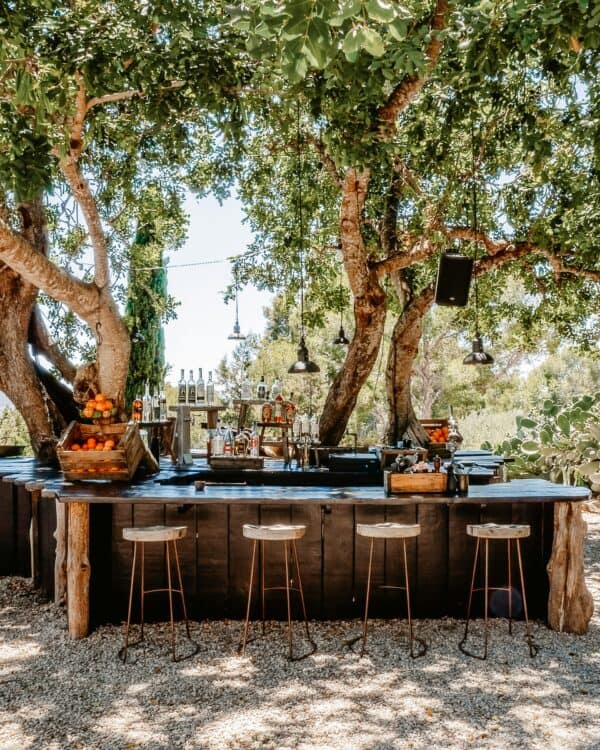
One of the most important decisions you’ll make in constructing an outdoor kitchen is the types of appliances you have installed. More appliances can give you a wider range of cooking options and make your outdoor kitchen more functional, but they’re also going to increase your total costs.
So what types of appliances should you have in an outdoor kitchen?
The (Almost) Unlimited Potential of Outdoor Kitchens
Outdoor kitchens come in all shapes and sizes. With prefabricated units, you can build something somewhat standard, but if you’re willing to design from scratch, you have nearly unlimited possibilities to choose from.
You can choose something conventional or unconventional. You can have every conceivable appliance, or just a couple of primary appliances. And, of course, you can customize the aesthetics to your liking so that you can always marvel at the beauty of your finished outdoor kitchen.
This is a great thing for most homeowners, as it allows them to envision and create the perfect outdoor kitchen for their needs. However, it also presents some challenges; notably, it’s extremely difficult to make a decision when there are so many viable choices available to you.
Types of Appliances to Consider
Some of the most important decisions you’ll make with respect to your outdoor kitchen are related to the appliances that you’ll install. Each appliance has something to offer, but it also requires space, and may require additional considerations, like access to utility lines.
Most people shopping for outdoor kitchens consider the following:
- Grills and griddles. Grills and their close cousins, griddles, are often the heart and soul of an outdoor kitchen. Even people without full outdoor kitchens sometimes cook outside by using these quintessential appliances. They can help you cook a wide range of foods using a wide range of techniques, and they require minimal upkeep.
- Refrigerators. An outdoor refrigerator can help you keep cold ingredients cold, while saving you the effort of constantly running back and forth between your outdoor kitchen and your indoor kitchen. Whether you need a refrigerator depends heavily on how much cooking you’re going to do.
- Ranges. Grills are excellent cooking instruments, but they come with some limitations. If you want a wider range of cooking options, you might consider investing in a range, or at least a side burner for your grill.
- Smokers. Although it’s possible to smoke meat indoors, it’s much more convenient and less messy to do it outside. Most smokers don’t take up much space, but they offer only limited functionality.
- Ice makers. If you plan on mixing and serving drinks outside, you’re going to want an ice maker as well. To save space, you might be able to find an outdoor refrigerator with an ice maker built in.
- Pizza ovens and other niche appliances. You can also consider a range of niche appliances, such as pizza ovens, which are designed for one somewhat limited purpose.
Key Factors to Consider
When shopping for appliances for your outdoor kitchen, consider the following:
- Available space. One of the most important things to consider is your available space. It might be nice to have a dozen or more kitchen appliances, allowing you to do practically anything, but your backyard might end up feeling crowded as a result. Of course, if you have a ton of yard space, you’ll have far more options.
- Budget. Kitchen appliances can be expensive, especially if they’re rated for the outdoors. Accordingly, you’ll need to carefully consider your budget before deciding which types of appliances you want to secure.
- Intended purpose. What types of cooking do you want to do? How often would you use a hypothetical appliance, and how much of an impact would it have? Some appliances offer broader utility than others.
- Kitchen appliances. You may also want to consider what types of appliances you already have in your indoor kitchen. For example, if you have an indoor refrigerator with tons of space that’s easily accessible from outside, you may not need an outdoor refrigerator as a supplement.
- Utility availability. Some appliances are going to require dedicated utility lines for things like water, electricity, or gas. This can increase the total cost and complexity of your outdoor kitchen.
- Future plans. Finally, think about your future plans. Are you going to move in the future? Are you thinking of expanding this outdoor kitchen in the future?
Choosing the right appliances for an outdoor kitchen can be tricky, especially if you don’t have a firm vision for what you want in your outdoor kitchen. But if you’re willing to narrow down your priorities and focus on your most important goals, you should be able to find the right balance of appliances for your needs.
 Gearfuse Technology, Science, Culture & More
Gearfuse Technology, Science, Culture & More


